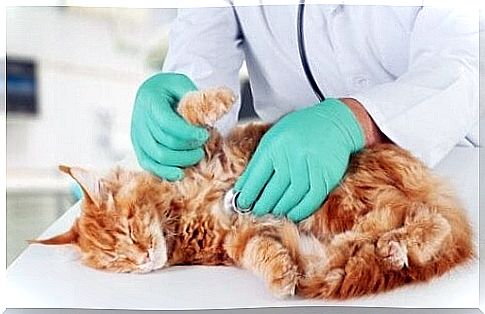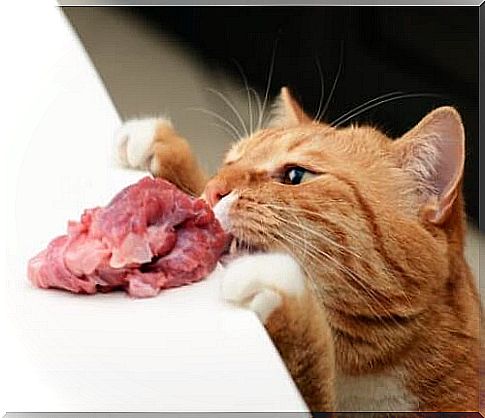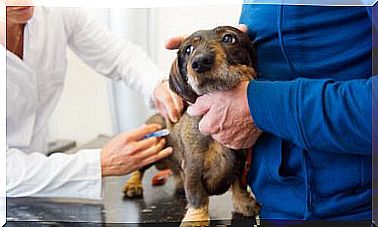Strengthen Your Cat’s Immune System: You Should Pay Attention To This

Cats are animals that get stressed out quickly. And when they’re stressed, they can develop health problems. In fact, there are diseases that they already have that can be triggered by stress, as it directly damages a cat’s immune system.
The immune system consists of a number of organs such as the thymus, lymph nodes, bone marrow, spleen or liver.
They make or store immune cells such as white blood cells, antibodies, and other substances that prevent bacteria and viruses from spreading; they also bind and remove toxic substances.
Therefore , maintaining a healthy immune system is vital to a cat’s life.
Diseases that affect a cat’s immune system
Some cat diseases cause direct damage to the immune system, while others get worse when the cat’s immune defenses are weakened for other reasons.
Feline Immunodeficiency Virus
Feline Immunodeficiency Virus, or FIV, is a disease caused by a virus in the retrovirus family. It is not known how the virus affects a cat’s immune system. All that is known is that the ratio of two types of lymphocytes, CD4 + and CD8 + lymphocytes, varies.
After infection, there is a period in which the cat shows symptoms that are common with any viral infection: fever, vomiting, or diarrhea. After that, the cat can remain a carrier for up to four years without showing any symptoms.
After this time, symptoms very similar to those of AIDS in humans appear. And if the animal survives, it will suffer from multi-organic secondary infections until it dies.

Feline Leukemia Virus
The feline leukemia virus or FeLV causes neoplasms or tumors and suppresses the activity of the bone marrow and the immune system in general. This severely weakens the cat’s natural defenses.
The symptoms of this disease are extremely diverse, but all patients develop different types of cancer.
Feline Infectious Peritonitis
Infectious peritonitis in cats is caused by a feline coronavirus (FCoV). This virus primarily affects and affects the intestines, causing diarrhea and other related symptoms.
However, for a reason as yet unknown, the virus appears to mutate and invade some cells of the immune system such as macrophages and monocytes.
These spread the virus throughout the body and cause systemic disease that kills the cat in less than a month or even 24 hours.
Tips for boosting a cat’s immune system
Despite the diseases that directly affect a cat’s immune system, there are a few factors you can control to prevent your cat’s immune system from becoming weakened.
Feed them high quality, untreated food.
Ideally, the cat should be fed raw meat or self-cooked food. If you cannot or do not want to find the time or financial means for such a diet, you can also feed your cat high-quality, well-processed canned food.
However, you have to make sure that the ingredients are known and that they contain neither additives nor preservatives.
Remember that the appearance of the food alone is not important. The industry can produce highly processed foods that look like meat but do not contain any meat. Therefore, you should read the ingredients very carefully before buying.
In addition, you should make sure that the food contains a sufficient amount of antioxidants, amino acids and omega-3s.

Food supplements to help boost your cat’s immune system
If your cat is already suffering from an illness or is elderly, it may be advisable to give her dietary supplement.
A variety of such supplements are available commercially, depending on the cat’s needs. In addition, the administration of specific food supplements could have a very positive effect at certain times of the year, for example in winter.
Do not vaccinate your cat more than necessary
If your cat doesn’t go outside and have no contact with other animals, vaccination may not be as important. However, this should be decided by a vet. Cats often develop tumors in the area where the vaccine was injected.
Even if you don’t get your cat vaccinated, it’s still important to take her to the vet at least once a year.
Avoid getting your cat too fat
As in humans , obesity can compromise a cat’s health and immune system. Provide her with a rich and inspiring environment in which to play and be active. You might even consider having more than one cat.
Avoid stress and stressful situations
As we mentioned at the beginning of the article, stress is your cat’s worst enemy. Cats are extremely sensitive animals that are on alert for much of the day, even when it doesn’t appear to be.
Changes in the home, excessive contact, loud noises, absence of a caregiver and other factors can cause stress in the cat.
This fact worsens the health of the animal and can even lead to the development of previously dormant diseases.









